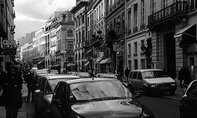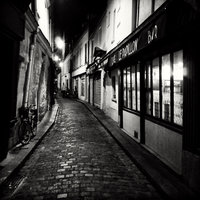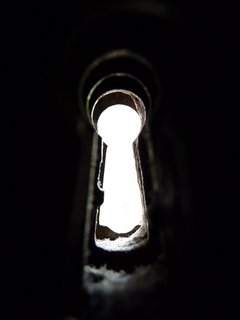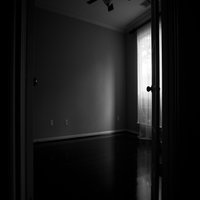- About Us
- Columns
- Letters
- Cartoons
- The Udder Limits
- Archives
- Ezy Reading Archive
- 2024 Cud Archives
- 2023 Cud Archives
- 2022 Cud Archives
- 2021 Cud Archives
- 2020 Cud Archives
- 2015-2019
- 2010-2014
- 2004-2009
 |
Short Fiction: |
For Part I of Wildflower, click HERE
The walk seemed longer than she remembered. Many of the shops and restaurants, she used to frequent were still there and the streets were still filled with artists and students, but nothing seemed familiar. It was more than the normal feeling of displacement one has when you return to a place after a few years and realize it has moved on without you. Some things had stayed eerily the same. It was like an old clock with some of it parts replaced. The faces she saw today were different, but they were performing the same functions. She could hear the same arguments and salutations.
The sense of displacement was not unique. She could find herself in a similar situation in the most familiar of places. She didn’t feel comfortable in the present, in the here. Here was never where she wanted to be. She always seemed to be looking for there. She was always able to regain her footing after the ideal crumbled, catch a glimpse of expectations waiting over the next horizon and move forward. Only when she reached that horizon, it never offered what she expected. It became a habit. There would be a new chapter, but reality would break in, and she would relinquish. Slowly each new wildflower would be hung, dried and pressed between the pages.
She was getting old. The horizon seemed much closer, no longer high enough to hide expectations behind, and the pages of her life were all filled with dried flowers. She no longer expected ideal cities to come to fruition or even germinate. When did vision dilute into just a dream or was there ever a difference? Was she in the stage of life where the future was no longer idealized, but memorialized?
Grace could not lose the feeling that the city was marking her movements. That its agents followed her, making sure she completed the journey it had set her on.
The corner of her eyes noticed more peripheral movement than usual. She could swear that there were figures she was just catching glimpses of, always just beyond the range of her eye. It created an anxiousness in her. At any moment there could be an agent of the city descending on her and forcing her into the shadows where she would disappear, absorbed into the city’s fabric. Another detail taken for granted by the city’s inhabitants.
She found herself repeatedly looking over her shoulder now as if a mob would appear at any moment driving her to the clinic’s door. She could almost feel the street under her feet directing her steps.
Her apprehension increased as she arrived at the front of the clinic’s old building. Many of the street level windows had been broken and boarded up and she could see the building sagging in on itself. The top was leaning forward; its faint shadow encroaching on the sidewalk. She envisioned the building falling and trapping her inside. Grace inhaled, moved towards the door, and knocked. The door made a flat hollow thud from the dry rot that had replaced solid wood.
An elderly gentleman, the landlord when the clinic had been there, greeted her at the door. He recognized her at once and smiled. She was surprised that he was still alive. He had been elderly the first time she had met him before the clinic opened. Now, he looked ancient. It was a jolt to her memory. She hadn’t thought about him for years; burying him in the past. Now, here he stood in front of her, resurrected, yet very much worse for the wear. It was if time was slowly scraping him off the canvas of this building. He still wore black pants, more faded than before, and a dingy brown button shirt. His pants had probably fit at one time, but they now bunched at the waist near the buckle of his belt. The tips of his shoes just barely poked out from the cuffs of his pants as if afraid of what could be outside. His face was longer, but was still covered with a greasy stubble. A familiar and pungent smell of tobacco, red wine and sweat clung to him.
The elderly gentleman had been something that had bridged the distance between her imagined Paris and the one she discovered. His eyes sparkled, and his smile was warm and inviting. She was always expecting him to break out in some French ditty and dance. He even wore a beret occasionally. But now the ideal memory seemed disrupted as well; no longer charming, but disjointed.
His smile was the same as she remembered it, but he had lost some teeth. Everything seemed to be in a state of decay, including the landlord, falling apart. His eyes were no longer playful. They were shrunken, hollow and resigned like they had seen and accepted what was inevitable. Nevertheless, he was a welcome comfort after the disconcerting walk.
The old man invited her in, and she crossed the threshold.
“Mademoiselle, it has been many years.”
“Hello, Jean-Francois. I am overjoyed to see you are among the institutions still standing that I remember and cherish from the days of the clinic.”
“I am less an institution, more the ruined foundation of one; if ever I was an institution, Mademoiselle Grace, but it warms my heart to see you are well. And there is very little that can still warm an old heart such as mine. Is there anything I can do for your?”
“I have heard rumors that the room of my beloved clinic is disappearing and I have come to pay my respects. Is it true that you are losing your home?
The old man smiled with a resolute sadness.
“I am provided for, but this building is to be taken down soon. It is true. I stay here to keep the transients out.” He smiled, and added, “We cannot have riffraff vandalizing the place, can we?”
He beckoned her to follow, and led the way to the back staircase. She counted the steps as they climbed. The number of steps had not changed, of course, but the climb seemed longer to Grace. Perhaps it was the walk here or that she was a little heavier now than she had been then, but her knees ached by the time they were at the top. It was as if the air around her began to weigh more.
They arrived at the final step in front of the door, and Grace was starting to become short of breath. The stairway hall seemed much narrower to her. She couldn’t help thinking of the condition of the building’s facade and wondering how close the walls were to crumbling in on top of her.
In the faint light slipping between the door and frame, the landlord selected a key, inserted it into the keyhole, and unlocked the door. The hinges struggled against the landlord’s pressure and grumbled in protest. The door opened and cold light poured into the stairwell. The landlord pushed the door open wide and let Grace pass into the room.
It was empty. Grace walked in a few steps and stopped. The room was a large rectangle, and a skylight in the middle of the high slanted ceiling provided most of the room’s light. A glass double door on the wall to her right led out to a balcony cut into the roof.
“I can’t understand it, Mademoiselle. This is such a bright and cheery room, but no one will stay here for long. Not since the masks were here. I think people still fear sans visage still haunt the air..”
She looked at the landlord, smiled in understanding, and turned to face the room again. The “faceless” as the locals had called them, the soldiers whose faces had been disfigured in the war, still haunted her. She would not be surprised if they lingered in this room as well.
Grace stood in the room’s silence. After a few moments of fidgeting, the landlord excused himself, and Grace heard his footsteps as they clunked down the stairway. She moved to the middle of the room. The quiet was insulating.
There was little trace of the medical facility she had helped run except for some 1X4’s still nailed to the wall that were used to hang the plaster casts, and the wallpaper they had chosen for the clinic. The skylight was dirty, but the room remained bright. The wallpaper, although a bit tattered now, was the same print of blooming bellis perenis, or the common daisy, that had lined the room when this had been the studio hospital.
She had come to Paris from New York. After college, her father secured her a job at a studio in the city where they mass produced statues and fountains for mostly large estate gardens and hotels. A business associate of her father owned it. She designed statues, mostly cherubs and mythological creatures like wood nymphs. She preferred a neoclassical style with clean lines and symmetry.
She had never really been interested in realistic figures. Could anything really be considered realistic when it was mass-produced? Could a figure become anything but idealized when a hundred exact copies are made? With idealized fantastical figures, she was able to keep a distance from the characters she created. She didn’t need to know much about them except perhaps for a general mood. Were they happy or mysterious, for example. This clinical distance would help her with the patients she would later help.
She did like to envision the world her creatures inhabited. It was the worlds she imagined that informed the figures she created. Once she knew where they lived, she would find its personality. But then creatures and the worlds they lived in seemed to lose some of their allure once the statues went into production.
She had her own apartment. Although not entirely independent, she was more or less free to do what she pleased. She knew she was fortunate. Her family could have tried to marry her off or pushed her into a more traditional role, but hadn’t.
She had heard about an Englishman who was creating masks in London for soldiers whose faces had been damaged in the War, and that the Red Cross was looking to open a clinic in Paris modeled after his work. They were looking for someone with an artistic background and experience in making plaster casts. With her education, experience, and her father’s connections, she got the job. The time between when she learned she would be running the clinic and when she left for Paris was able to lose herself and get caught in the moment or where at least expectation had commandeered the moment.
She followed the line the 1X4’s drew across the room’s wall. The masks that had hung there had become the clinic’s guardians for her, keeping the worries and evils outside its doors. They greeted people as they walked into the clinic. Notre Dame had its gargoyles, her clinic had the silent faces of the War’s wounded.
The task of making the masks had seemed daunting when she started. Her training was in art. She knew nothing of the medical field. Although the statues she had created in New York would often have human characteristics, the nymphs, angels and fairies she designed had very little to do with creating flesh and blood looking faces.
But she quickly realized a background in more realistic themes wouldn’t be of great help. For many, the only recent pictures they had of their former faces were photographs taken by the military. She had expected with so little to work with, the masks would come out looking very different from what they were replacing. But the soldiers would tell her when they saw their faces put back together for the first time, that it was uncanny how close she and the other artists came to getting it. She hadn’t thought much of the comments at first; but even family member of the worse cases, who previously had trouble recognizing the their loved ones, immediately recognized the face created with the help of masks.
She had found that talking with patients had been the most help in reconstructing their faces. It was through their personalities she began to have an idea of what they looked like, or should look like now. Trying to fit a patient’s personality into the mask was the trick. It amazed her how much of an assembly line product the human body was. No matter where you travelled in the world, a nose was a nose. The difference in any face was negligible. It was even a bit comforting. Everyone seemed plain, copies of one another. Too little a difference for there to be so much animosity between people or maybe that was the need, to keep others from being like you.
The cold was sneaking into the room through the seams of the skylight. The sunlight slipping between passing clouds kept it warm enough, but she was beginning to feel the chill of the room. She walked over to the glass doors that led out to the balcony. It was cold to the touch.
She could not understand where her apprehension was coming from. She had left satisfied with what they had accomplished. And with few exceptions, she didn’t remember anything terribly horrible or disturbing. But there was something ugly lurking behind her memories, similar to the garden shadow she encountered earlier. But she couldn’t put a finger on what it was. It wasn’t any one memory, but a strain that threaded throughout all of them. Something that had attached itself after, like a tic. It was the feeling that this moment was a revolving door and that if she lived long enough she would greet it again.
As she looked over the Latin Quarter, she no longer felt alone, and caught what looked like a movement from the corner of her eye. She turned, but the room was empty. She looked up towards the skylight. Wind was pushing clouds across the afternoon sky. The room’s light was interrupted by shadows racing across the floor. She guessed that it had been these shadows which caught her attention.
As she turned and looked through the balcony doors again, a definite figure caught her eye in the reflection of the the glass. Startled, she turned quickly to see a soldier, or someone in what looked like a soldier’s attire, standing near the doorway. Grace gasped and stepped back from the figure. He was in dress uniform, but she couldn’t tell by the uniform what country he was from. It wasn’t French.
The room remained silent. She had not heard him enter the room. She could not hear him now. “Can I help you?” she asked, but received no answer. The room seemed to absorb her echo. He looked young, too young to be one of the clinic’s patients, but she moved closer to look at the soldier’s face anyways. His posture was too straight for one of the faceless.
As she studied its face for signs of a mask hiding a soldier’s scars, she was surprised to find she couldn’t focus on any feature of its face. There was shape to it. You could see indentations where the eyes, ears and mouth would be, but there was nothing but shadows in their place.
Maybe it was something, a mannequin perhaps, the landlord had brought up to store in the room while it was open. But why would he own, store or move something like this in a condemned building anyways? She walked closer to the figure. It appeared solid enough. As she drew closer, she thought that, although the soldier was standing at attention in a dress uniform with polished shoes, there was nothing well defined about the uniform. The soldier, if that is what it was, remained motionless. The more she looked at the figure she realized how little detail it retained. “Who are you?” she asked, but again received no reply. It was starting to annoy. The figure just stood in place, and for the lack of a better word, stared straight ahead.
The patches and medals had no specific features to them. She couldn’t tell rank or what military the figure represented. As she moved still closer to the figure, the air grew cold around her.
She stopped a few feet in front of the figure. It looked real enough. “If someone has just set this here, please answer,” she spoke in the unresponsive air.
The figure shifted its weight and Grace froze. It appeared to be breathing as well, or at the least the chest was contracting and expanding.
She was at a loss at what to do. It stood in place between her and the door. Would it stop her if she tried to leave?
“What do you want?” she demanded. “Are you here for me?” She wasn’t sure this thing could even hear or see her. Slowly she moved back towards the balcony door.
She looked at the exit blocked by the figure and around the room for any way out. She had felt a similar feeling of entrapment when the clinic’s first patient arrived. There had been a feeling of helplessness then. He had been a shock to the whole staff. The clinic’s set up had gone smoothly, and it being a medical facility, everything had a clean and uniform look. The patients started showing up, and she had been forced into reality again. Reality wasn’t clean. You could sterilize yourself from only so much.
The figure raised its right knee and proceeded to silently stomp its foot to the floor. It began to march and Grace was in its path. She couldn’t breathe or move, frozen in her spot. The figure marched almost right up to where she was standing, stopped, did an about face, and marched back to its original spot where it turned around and started the march again. As it approached her a second time, she wanted to reach out and touch it, but couldn’t. What if her hand went through? What if it didn’t?
She tried to stop the panic in her. She didn’t appear to be in any immediate danger from the figure. The silent march was unnerving, but the figure did not seem to have a malicious intent or to even notice her for that matter. Why was it here? It reminded her of a ceremonial guard, the kind you saw in front of a monument or dignitary’s coffin. But there were no dignitaries or monuments here. The figure was just marching.
She could hear the footsteps in her head now. She couldn’t stop watching it march back and forth. The apprehension was leaving her, but she still wanted to know what was going on. Was she dreaming?
This room had always held the surreal for her. The sheer numbers of patients that had walked through the door, the need for masks at all, the fact that she was trying to help these patients regain their ordinary lives, but she hadn’t really felt guilty, not at the time at least. There had been too much to do, much of the time it felt more like a cooperative art project, then a hospital full of patients.
The pacing was getting to her. She wanted to see how this played out, but her nerves were wearing thin. What was it doing here? What was the point of him marching and of his uniform? She wanted to ask it to stop, but couldn’t. What if what it was doing was important in someway?
How do you confront a ghost? Especially one that wouldn’t leave. Should she reach out and tap it or grab it by the arm as it came near? Would it hear her if she spoke out again? Even if she could get it to acknowledge her, would it stop or attack her or would it just continue to march? Could she find a sufficient answer?
After the clinic closed, Grace decided to return to America. There was no expectation of a new life. She moved out west and settled into a cottage near the ocean. She had braced herself for a bout of depression that never came. The familiar seemed to bring comfort. The horizon only interrupted by the occasional white cap.
She decided to break the silence once more. “Excuse me,” she heard herself say shakily. She reached to grab its arm, but caught nothing except cold air between her fingers. She wasn’t sure if she had passed through its arm or it had moved too quickly and she had missed it. She didn’t try again. It would end in the same fashion she thought, grasping only air. This was not real either. The circles, the repetition, the rhythm. It was all tricks with ropes and mirrors, a fun house attraction her mind had arbitrarily constructed.
It was too much. The room was darkening with the afternoon sun. It was time to go. She would not get the answers she wanted from this. Grace left the figure marching and headed down the stairway, closing the door behind her. The landlord was standing near the entryway to say goodbye.
Not wanting to say anything about her experience, either he already knew of it or would think her crazy, she said a quick farewell, and was about to leave. But she paused, and asked what was to become of the plot the building was on.
“Mademoiselle, nothing that I know of. I imagine for the moment, it will be abandoned to the gourdons, yellow iris, and weeds.”
She smiled at him for a brief moment. “Perhaps the neighborhood could do with a little color.”
“Perhaps,” he replied as he watched her depart out the front entrance.
She would find the daisy bookmark years after paging through her mother’s Bible on a visit home. That her mother held on it it surprised her a little.
“I had meant to put it some place safe so it wouldn’t get lost, dear, but found myself keeping it nearby. I can’t tell you why, a reminder of our walk I suppose.”
The building’s door closed behind her with a flat thud. She heard the lock catch and walked down the marble steps for what she knew was the last time. She shivered. With the sun setting, a chill was wandering through the still, empty streets carried by a slight breeze. In the failing light, she could still see a thin veil of clouds blowing from the east horizon.
This would be the last time, she thought. She would be leaving to head back to New York and then back to California after a short visit. It would be her age or the Germans that would keep her from making this trip again. Most likely it would be both, but at this time of day, with the quiet winding walk back to her hotel, in this city which masked its own wounds and scars, she was not willing to confront either of those ideas.
